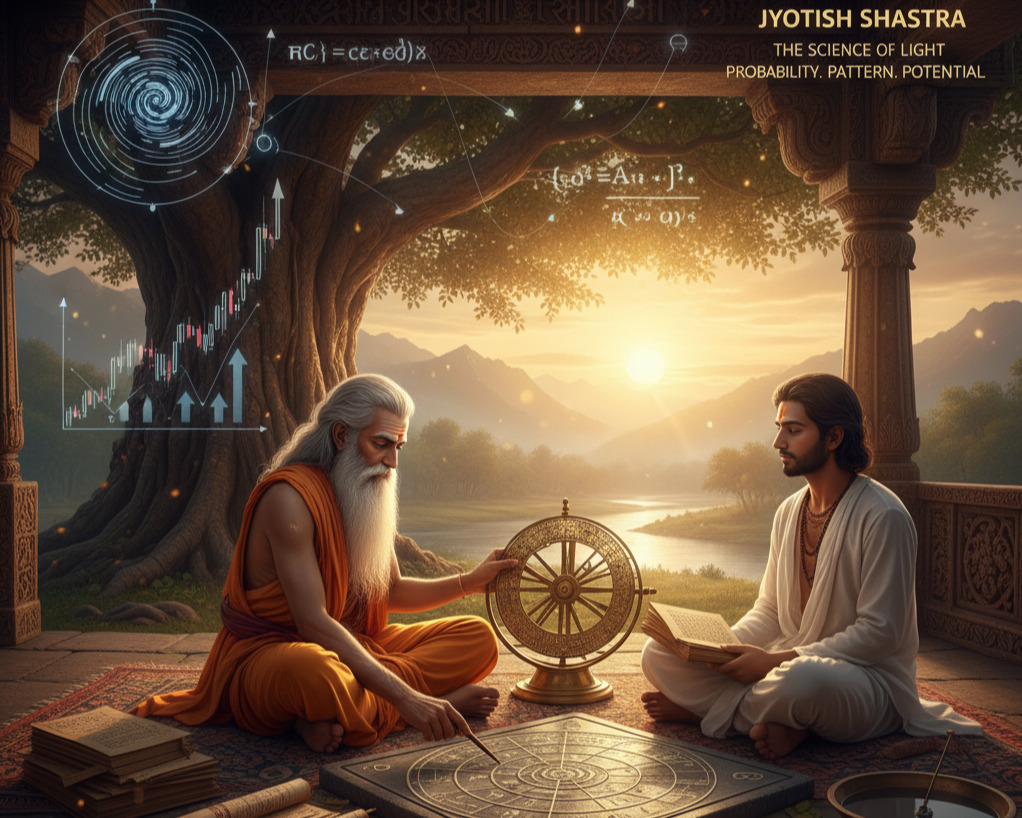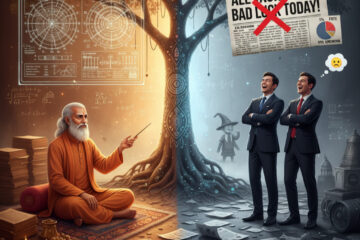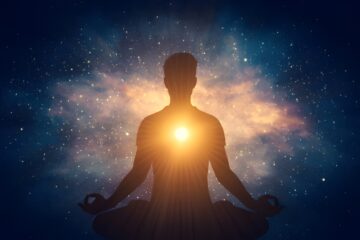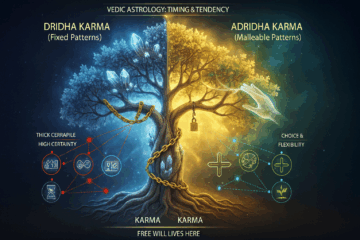When people first ask “what is Vedic astrology,” they usually expect either mysticism or fatalism. Real Jyotish is neither. Vedic astrology, or Jyotish Shastra, is an applied timing science that maps celestial motion against human experience. It is a structured, testable system built on astronomy, mathematics, and long-term human observation — and then interpreted through judgment, context, and compassion. So yes, it’s technical. But it is also deeply human.
The ancient seers (rishis) who developed what we now call Vedic astrology did not guess. They observed correlations between planetary movement and life outcomes across generations, recorded patterns, refined timing logic, and preserved that knowledge in classical texts such as Brihat Parashara Hora Shastra. The result is a predictive framework that behaves more like weather modeling than fortune-telling: it projects tendencies, cycles, stress windows, and opportunities.
In practice, that means Vedic astrology is not about “you will definitely do X at age 32.” It’s closer to “the chart suggests a career pivot around 32, with pressure from authority figures; prepare for that window.” Prediction here is probabilistic, not absolute. The aim is awareness and alignment — not fear.
What Is Vedic Astrology, Structurally?
To understand what makes Jyotish unique, break it down into three pillars and how they work together:
- Astronomy: Exact planetary positions at your birth are calculated using the sidereal zodiac. This is math. Where was Saturn? Where was the Moon down to degrees and minutes? What nakshatra was rising?
- Mathematics: Those positions are then divided, compared, and re-projected into divisional charts (like D9 for marriage and dharma, D10 for career, and so on). We also generate dashas (planetary periods) that describe when certain karmic themes become active.
- Empirical interpretation: Over centuries, astrologers noticed that certain combinations, called yogas, repeat in the charts of people with similar life arcs. Those yogas become interpretive rules, always checked against dignity, timing, and context.
When you hear someone ask “is astrology scientific,” this is usually the missing nuance: the measurements absolutely are scientific — they are astronomy and math. The interpretation is an applied art built on pattern recognition. That makes Jyotish closer to meteorology, economics, and clinical psychology than to superstition.
In other words: the planets are data. You are the lived expression of that data — filtered through family, culture, choices, trauma, discipline, grace, and timing.
Vedic Astrology vs Western Astrology
One of the first questions serious students ask after “what is Vedic astrology” is “how is it different from Western astrology?” The short answer: different reference frames, different emphases.
- Reference system: Vedic astrology uses the sidereal zodiac (tied to actual star positions), while most modern Western astrology uses the tropical zodiac (tied to seasonal equinox points). This alone can shift someone’s Sun sign.
- Timing focus: Vedic astrology relies heavily on dashas — planetary period systems like Vimshottari Dasha — to map what life chapter is currently “on stage.” Western astrology leans more on transits and psychological themes.
- Divisional charts: Jyotish breaks the natal chart into many harmonic charts (D7 for children, D9 for spouse/inner dharma, D10 for career, etc.). These are not decorative; they’re core to serious analysis.
- Yogas: Jyotish catalogues planetary combinations (yogas) that correlate with status, delay, struggle, sudden rise, wealth potential, spiritual intensity, and so on. Western astrology has aspects and configurations, but the yoga system plus house rulership logic is its own tight predictive grammar.
That does not make Western invalid. It just means Vedic astrology is unapologetically predictive and time-based. It always asks: When? Under what dasha? During which transit? And is this repeating across divisional charts, or is it a one-off?
Is Astrology a Science or Superstition?
This is a loaded question, especially for students who want to respect tradition but also want intellectual honesty. Here is the clean answer.
Astrology is an interpretive science. The astronomical layer is measurable. The mathematical layer is rigorous. The interpretive layer is probabilistic. The moment you move from “Saturn is at 15° Aquarius” (pure fact) to “Saturn in your 10th house will test your career responsibilities” (interpretation), you’re doing structured inference, not mechanical physics.
That does not make it superstition. It makes it more like weather forecasting. A meteorologist uses fluid dynamics and satellite data to say, “There is an 80% chance of heavy rain tomorrow.” If you carry an umbrella, you are not “surrendering to fate.” You are being intelligent with forecast data. Jyotish is similar. It is about awareness, not helplessness.
So when someone asks if astrology is real, ask back: are you expecting absolute certainty, or are you asking whether an experienced astrologer can identify high-probability windows for career change, relationship stress, financial pressure, spiritual openings, and mood shifts? Those are very different standards.
How Prediction Works in Jyotish
Good Jyotish prediction is layered. We never, ever lean on a single factor. We look for repetition across systems. Here’s the basic workflow:
- 1. Natal promise: The birth chart (D1) shows baseline potentials. Are there strong yogas for leadership? Is there a sensitive Moon-Saturn combination that suggests emotional heaviness (often called Visha Yoga)? Is Mars pushing aggressively into relationship houses and creating Manglik-like tension?
- 2. Functional nature of planets: A planet is not “good” or “bad” in a vacuum. Its functional nature depends on house rulership for that specific lagna. A natural malefic like Mars can become a functional benefic if it rules auspicious houses (trikona or kendra). This is why generic cookbook astrology often fails — functional dignity matters more than generic labels.
- 3. Divisional charts: We zoom in. D9 (Navamsa) for marriage, dharma, the mature expression of the planet. D10 (Dasamsa) for career. If something shows in D1 but not in the relevant divisional, it’s weaker. If it repeats in both, probability increases.
- 4. Dashas: Dashas tell you when the storyline promised in the natal chart actually steps onto the stage. The Mahadasha lord describes the era; the Antardasha lord describes the scene. Dasha proposes.
- 5. Transits: Transits (especially of slow planets like Saturn, Jupiter, Rahu, Ketu) tell you how reality responds to that storyline. Transit disposes. If the dasha lord and a slow transit hit the same house/theme, the timing window is hot.
Notice the logic: chart promise → divisional confirmation → dasha activation → transit delivery. We are not throwing random predictions. We’re layering alignments and asking, “Do at least two or three independent techniques say the same thing at the same time?”
This is why experienced astrologers can give surprisingly accurate timing for career shifts, marriage developments, relocations, children, or health stress. It’s not magic. It’s synthesis.
Does Vedic Astrology Remove Free Will?
No. Jyotish does not erase agency. It maps karma. Your chart shows what you are more likely to experience, what kinds of lessons tend to repeat, and when the pressure tends to spike. But how you respond inside those windows is still yours.
An analogy we use often: astrology is the weather, not your behavior in the weather. If the forecast says “storm,” you can brace your windows or go dance in the rain or pretend it’s sunny and get soaked. The chart can’t choose for you.
In classical language this is framed as desh, kaal, paristhiti — place, time, circumstance. The same Mars placement will not behave identically for a rural farmer in 1500 BCE and a startup CTO in 2025. Context modifies expression. This is why ethical astrologers don’t make one-size-fits-all prophecies. We translate the symbolism into the native’s real environment.
Can Jyotish Be Wrong?
Yes — and every honest astrologer should say that upfront. Jyotish can miss in a few predictable ways:
- Birth time inaccuracy: If your birth time is off by even a few minutes, divisional charts (especially high-division charts like D9, D10, D60) can shift. Special lagnas like Arudha Lagna, Ghati Lagna, Hora Lagna can shift. Kota Chakra timing changes. So the “input data” matters enormously.
- Over-simplified reading: Reading a single yoga in isolation and declaring fate is amateur work. Yogas coexist. They rarely cancel each other. Life is mixed. A chart can absolutely show both privilege and pressure.
- Zero desh-kaal-paristhiti framing: If the astrologer recites classical results literally (“you will rule land and elephants”) without mapping that symbol into modern context (“you will control assets and infrastructure”), the reading will sound wrong even if the underlying logic is right.
High-quality prediction comes from humility. It says, “Here are the tendencies. Here’s when they’re louder. Here’s what you can do with that knowledge to act with more clarity instead of more panic.” That is ethical Jyotish.
Is Vedic Astrology Accurate?
Students often ask this next, right after “what is Vedic astrology.” The answer: it can be extremely accurate in describing themes, patterns of experience, karmic cycles, and windows of pressure or breakthrough — especially when the birth time is correct and the astrologer has put in actual chart hours.
Accuracy drops fast when someone treats Jyotish like “fortune cookie sentences.” If you’re expecting guarantees, you’ll be disappointed. If you’re looking for probability windows and karmic pattern recognition, Jyotish can feel almost uncomfortably precise.
There’s also a psychological piece here. Seeing your own patterns laid out can feel like destiny when it’s really recognition. Jyotish doesn’t force you to be a certain way; it mirrors you. Sometimes that mirror is compassionate. Sometimes it’s blunt.
Important Notes
Is astrology a science or superstition?
It’s not blind superstition, and it’s not hard physics. Jyotish sits in the middle as an interpretive science: astronomy and math build the chart, and interpretive logic extracts probabilities. It’s closer to psychology or meteorology than to “close your eyes and believe.”
If astrology is probabilistic, can predictions ever be accurate?
Yes, often. But three things must line up: (1) correct birth time and location, (2) an astrologer who knows how to synthesize yogas, dashas, divisional charts, and transits responsibly, and (3) context (desh, kaal, paristhiti). When those align, Jyotish can describe timing windows with impressive clarity. When they don’t, accuracy drops.
How is astrology similar to weather or stock prediction?
Weather models use pressure systems to forecast storms. Market analysts use signals to anticipate volatility. Jyotish uses planetary positions, yogas, dashas, and transit activation to model life stress and opportunity. All three disciplines are probabilistic. All three can warn you in advance. None of them are 100% deterministic.
How is Vedic astrology different from Western astrology or KP?
Vedic astrology (Parashari) uses the sidereal zodiac, divisional charts, yogas, and dashas. Western (tropical) tends to emphasize psychological archetypes and transits. KP (Krishnamurti Paddhati) is a streamlined, timing-heavy system that leans on nakshatra sub-lords. Parasari Jyotish remains the most holistic and layered, but these systems are not enemies — they answer different questions with different lenses.
Does astrology override free will?
No. Astrology shows karmic weather. You still choose how to navigate it. Strong placements can ease the path; difficult placements can demand effort, patience, discipline, or humility. Your response is part of the karma too. Jyotish informs choice — it does not cancel choice.
FAQ
What makes Vedic astrology “Vedic”?
Jyotish is one of the six Vedangas, or “limbs” of the Vedas — the traditional sciences that supported Vedic ritual and spiritual life. “Vedic” here means it’s rooted in the same philosophical and cosmological worldview as classical Indian thought. Jyotish is literally “the science of light,” implying that planetary light and karmic light are reflections of the same cosmic order.
How can astrology be mathematically complex if it’s “spiritual”?
The spirituality sits on top of serious calculation. We compute planetary longitudes, apply ayanamsha corrections, erect divisional charts, calculate dashas down to sub-sub periods, and assess strengths (Shadbala, Ashtakavarga, etc.). The interpretive poetry rides on ugly spreadsheets and geometry. That’s the beautiful secret of Jyotish.
Can astrology predict events with certainty?
No. Jyotish predicts high-probability events and stress/opportunity windows. It can say, “Relationship themes activate this year,” or “Career turbulence peaks in this Saturn–Rahu period.” But the exact script — whether you break up or negotiate better boundaries — depends on actual human choice and circumstance.
Why do two astrologers read the same chart differently?
Because Jyotish is synthesis. One astrologer may prioritize yogas and functional benefics; another may prioritize divisional charts and timing lords. Both may be “correct,” just describing different facets of the same karmic pattern. As with two skilled doctors reading the same scan, nuance and experience shape emphasis.
In practice, if multiple experienced astrologers independently highlight the same dasha window or the same recurring yoga, pay attention. Repetition is confirmation.
Keep Learning with Much Needed Astro
If you’ve ever asked “what is Vedic astrology” and felt like every answer was either mystical fluff or doom-speak, you’re not alone. Real Jyotish sits in the middle: technical, compassionate, timing-oriented, and honest about limits. We are not here to scare you. We are here to give you language, timing, and agency.
Stay with Much Needed Astro as you keep going. We’ll keep showing you how to read yogas, dashas, divisional charts, Kota Chakra — and how to apply them with context, ethics, and sanity. If you’re serious about studying real Jyotish, Much Needed Astro is here for the long game: no fluff, no fear-mongering, just clarity you can actually use.




